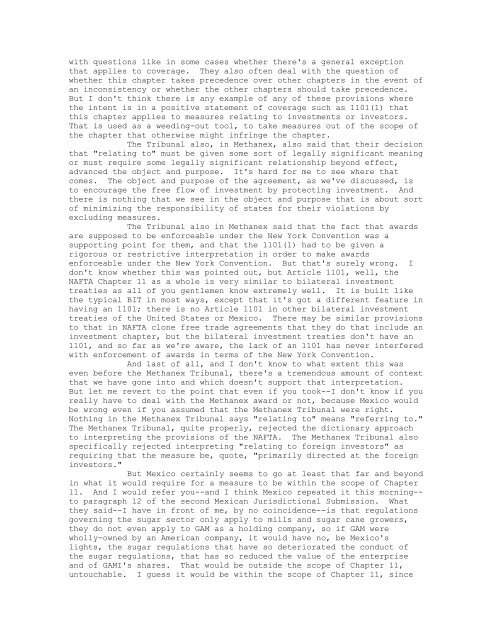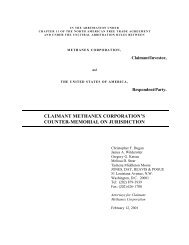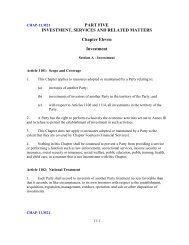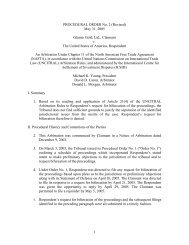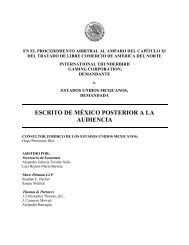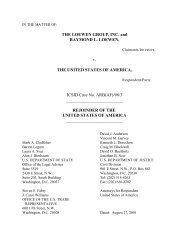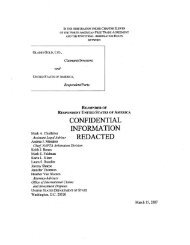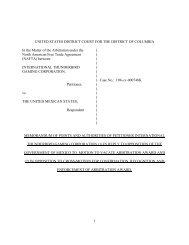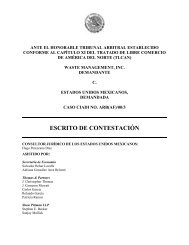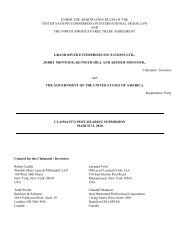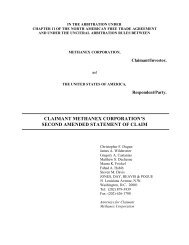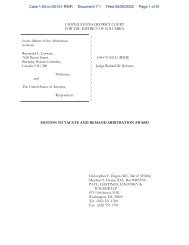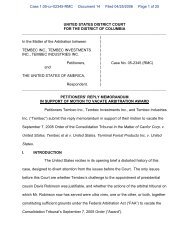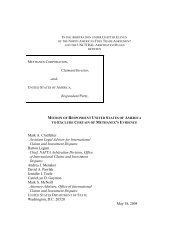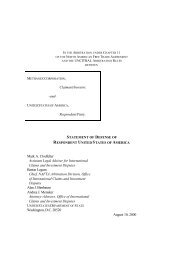GAMI INVESTMENTS, INC. - NAFTAClaims
GAMI INVESTMENTS, INC. - NAFTAClaims
GAMI INVESTMENTS, INC. - NAFTAClaims
You also want an ePaper? Increase the reach of your titles
YUMPU automatically turns print PDFs into web optimized ePapers that Google loves.
with questions like in some cases whether there's a general exception<br />
that applies to coverage. They also often deal with the question of<br />
whether this chapter takes precedence over other chapters in the event of<br />
an inconsistency or whether the other chapters should take precedence.<br />
But I don't think there is any example of any of these provisions where<br />
the intent is in a positive statement of coverage such as 1101(1) that<br />
this chapter applies to measures relating to investments or investors.<br />
That is used as a weeding-out tool, to take measures out of the scope of<br />
the chapter that otherwise might infringe the chapter.<br />
The Tribunal also, in Methanex, also said that their decision<br />
that "relating to" must be given some sort of legally significant meaning<br />
or must require some legally significant relationship beyond effect,<br />
advanced the object and purpose. It's hard for me to see where that<br />
comes. The object and purpose of the agreement, as we've discussed, is<br />
to encourage the free flow of investment by protecting investment. And<br />
there is nothing that we see in the object and purpose that is about sort<br />
of minimizing the responsibility of states for their violations by<br />
excluding measures.<br />
The Tribunal also in Methanex said that the fact that awards<br />
are supposed to be enforceable under the New York Convention was a<br />
supporting point for them, and that the 1101(1) had to be given a<br />
rigorous or restrictive interpretation in order to make awards<br />
enforceable under the New York Convention. But that's surely wrong. I<br />
don't know whether this was pointed out, but Article 1101, well, the<br />
NAFTA Chapter 11 as a whole is very similar to bilateral investment<br />
treaties as all of you gentlemen know extremely well. It is built like<br />
the typical BIT in most ways, except that it's got a different feature in<br />
having an 1101; there is no Article 1101 in other bilateral investment<br />
treaties of the United States or Mexico. There may be similar provisions<br />
to that in NAFTA clone free trade agreements that they do that include an<br />
investment chapter, but the bilateral investment treaties don't have an<br />
1101, and so far as we're aware, the lack of an 1101 has never interfered<br />
with enforcement of awards in terms of the New York Convention.<br />
And last of all, and I don't know to what extent this was<br />
even before the Methanex Tribunal, there's a tremendous amount of context<br />
that we have gone into and which doesn't support that interpretation.<br />
But let me revert to the point that even if you took--I don't know if you<br />
really have to deal with the Methanex award or not, because Mexico would<br />
be wrong even if you assumed that the Methanex Tribunal were right.<br />
Nothing in the Methanex Tribunal says "relating to" means "referring to."<br />
The Methanex Tribunal, quite properly, rejected the dictionary approach<br />
to interpreting the provisions of the NAFTA. The Methanex Tribunal also<br />
specifically rejected interpreting "relating to foreign investors" as<br />
requiring that the measure be, quote, "primarily directed at the foreign<br />
investors."<br />
But Mexico certainly seems to go at least that far and beyond<br />
in what it would require for a measure to be within the scope of Chapter<br />
11. And I would refer you--and I think Mexico repeated it this morning-to<br />
paragraph 12 of the second Mexican Jurisdictional Submission. What<br />
they said--I have in front of me, by no coincidence--is that regulations<br />
governing the sugar sector only apply to mills and sugar cane growers,<br />
they do not even apply to GAM as a holding company, so if GAM were<br />
wholly-owned by an American company, it would have no, be Mexico's<br />
lights, the sugar regulations that have so deteriorated the conduct of<br />
the sugar regulations, that has so reduced the value of the enterprise<br />
and of <strong>GAMI</strong>'s shares. That would be outside the scope of Chapter 11,<br />
untouchable. I guess it would be within the scope of Chapter 11, since


